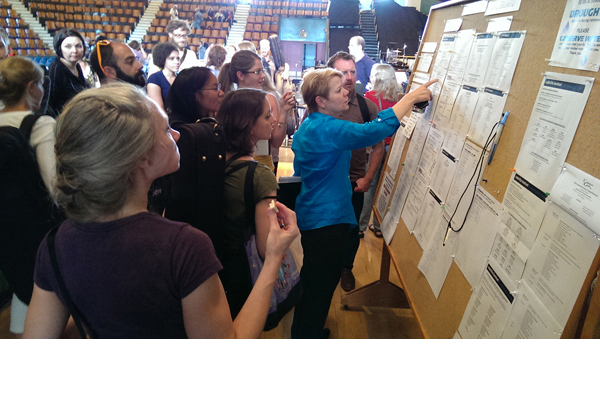The things that have changed is that the audience has grown tremendously, and the orchestra has grown as well, artistically and technically.
The festival is distinctive because it focuses only on contemporary music. Why is it important to stick to that mission?
I think in our regular subscription seasons, new music is a bit of a taboo subject. A lot of people are terrified about the idea of new music. I always try to tell them you have to remember Beethoven was once new music too. And that frames it a little better.
And to have not only this great number of musicians who are so expert, but also to have an audience that is so open to hearing all contemporary music, when in the main seasons, putting even one contemporary piece on the program would probably be met with trepidation by audiences.
You’ve invited Missy Mazzoli, Mason Bates, Hannah Lash, and Nico Muhly, among others, to be resident composers at this year’s festival. What do they have in common?
I think they represent a new generation of composers. They’re all quite young. They’re all extremely energetic and vibrant. They have very distinctive voices. What really appeals to me is that they use our 21st century sound-world to incorporate into their pieces. To have technology involved is also a hallmark of this younger generation that is so comfortable with blending these new technologies into the acoustic orchestra.
Tell me about the piece you’ve commissioned — “Eating Flowers” by Hannah Lash — which is getting its world premiere at the festival.
This is a piece that is part of a project that [American composer] John Adams started with us several years ago now, where John identifies a young composer and sponsors a short commission by that composer. So Hannah Lash is a new composer to the festival and to me. Her piece is quite minimalist. She has these arpeggiated, repeated figures that we associate now with minimalist music. I think for a young composer she’s able to create a unique sound world. So it really is a very cool, kind of magical piece.
How does new orchestral music become part of the standard repertory when so few orchestras are willing to program contemporary music?
This is the big challenge for new music. All I can look to are a few pieces I conducted here at Cabrillo, like James MacMillan’s Veni, Veni Emmanuel, his first percussion concerto. I fell in love with MacMillan’s music through this piece. And Veni celebrated its 300th performance [in 2003]. It’s a piece that has become part of the standard repertoire. And I think there are certain pieces by John Adams that have become part of the standard repertoire. But it takes hundreds of performances, I think, to make this happen. And it takes being championed by many artists, conductors, or soloists to be successful.
So in my lifetime, I’ve witnessed half a dozen, maybe even a dozen [works], that have really put their mark on the standard repertoire. It doesn’t happen that often, that’s for sure.
There are so few women running classical music organizations. What is your responsibility as the conductor at the Baltimore Symphony and at Cabrillo to change that?
People often ask me why there aren’t more women conducting on the podiums of the world. It certainly hasn’t changed dramatically over the last 30 years since I was a young conductor. I was surprised by that. I sort of assumed that there would be more and more women in these roles. But I think that unless we as women in leadership roles decide to be really proactive in changing the landscape, it won’t change. So it manifests for me in a fellowship that I created in 2002 for young women conductors. We just appointed our 11th recipient of the fellowship. And I I have to say that of those women, they’re all doing fantastically well. Four of the women are American music directors. Another has her own orchestra. So everyone is succeeding in changing that landscape for future generations.
I read that your mother supported your dream of being a conductor despite the fact that there were very few women conductors when you were coming up. What did she say to you?
Oh my mother and my father both supported my dream to become a conductor. But my parents were both professional musicians, so as long as I was going to be a musician, they were very happy. When I was told things like, “oh girls can’t be conductors,” my mother would always say, ‘that’s the most ridiculous thing I’ve ever heard.” Growing up in a family where there were no restrictions and no preconceptions about what a girl could or couldn’t do was instrumental in my pursuing my dream.
Did anyone ever tell you, “you’re a woman so you can’t do this”?


